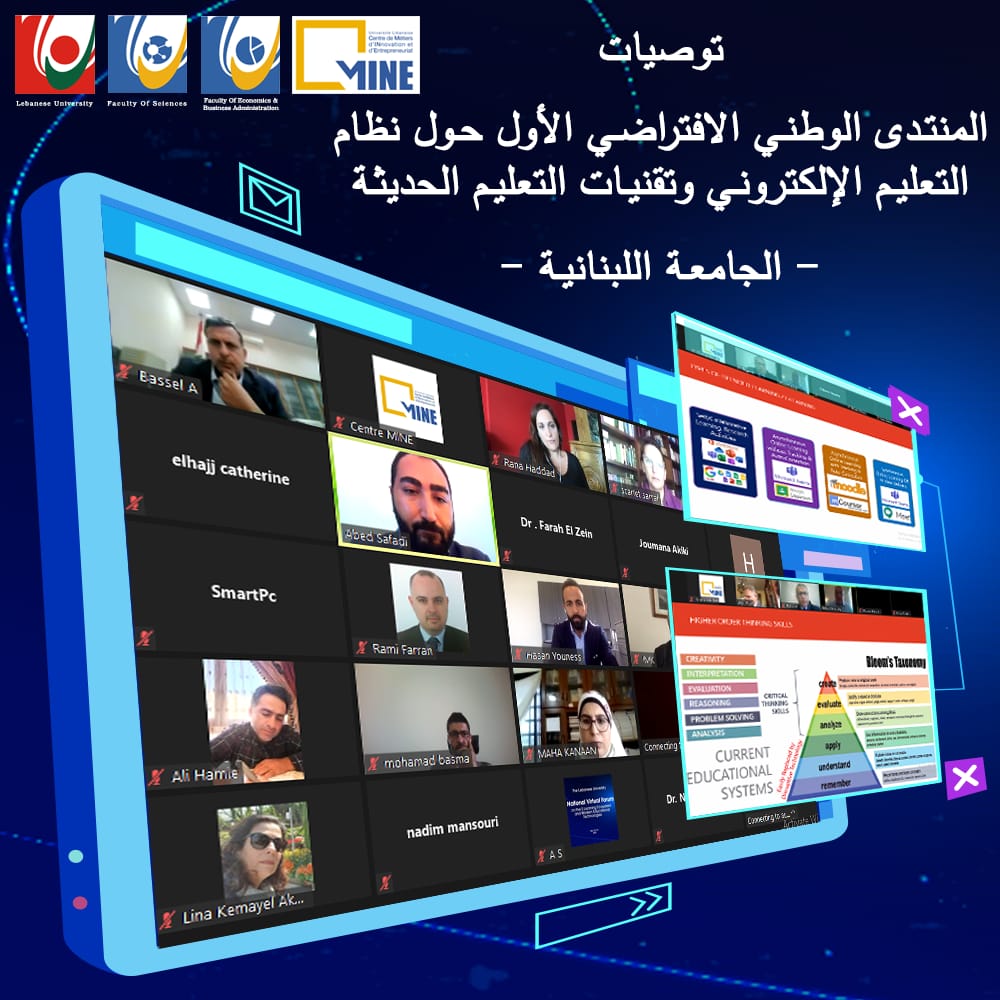
Under the patronage and participation of the President of the Lebanese University, Prof. Fouad Ayoub, the Faculty of Science and the Faculty of Economics & Business Administration, in cooperation with Center MINE, organized the first virtual national forum on e-learning and modern education technologies on 15-16 September 2020.
The forum was attended by a number of MPs, members of the Parliamentary Education Committee, Dr. Hussein Hajj Hassan, Chairman of the Media and Communications Committee, Mr. Bassel Al Ayoubi, Director General at the Ministry of Telecommunications, Mr. Imad Kreidieh, Director General of the Ogero Commission, in addition to Lebanese and foreign academic experts and researchers who participated in five virtual sessions that discussed the legislative, technical, social and educational dimensions of e-learning and the Lebanese and international experiences in this field.
The forum concluded with a set of recommendations as follows:
First: On the legislative level
· The importance of issuing necessary laws to meet e-learning requirements;
· Establishing an accrediting body for higher education and e-learning to set standards for electronic programs;
· Establishing a national institution specialized in e-learning, which constitutes an educational scientific reference for educational institutions that wish to use this model of education;
· Legislation should include a list of degrees in specific tracks compatible with this new educational method in Lebanon, and specify the technical and human requirements for educational institutions and students before adopting the e-learning process.
Second: On the educational and social levels
· Building new educational knowledge foundations compatible with this new educational model by training the teaching staff on e-learning programs, especially at the level of content and presentation;
· Emphasizing the importance of educational institutions to graduate students who are able to deal with yet unknown problems and jobs, and use yet unavailable technologies;
· Working on designing and dividing the educational system in order to foresee obstacles and pursue operating in various circumstances;
· Training the teaching staff on remote evaluation process, especially in an innovative way through critical questions, analysis and research;
· Reconsidering e-learning requirements, starting from the high-level infrastructure to studying the behavioral changes of the learner;
· Preparing academic curricula that keep pace with e-learning process;
· Establishing a Master's degree in the Faculty of Pedagogy specializing in training university professors on modern educational methods;
· Studying the social reality in the event that “hybrid learning” is adopted in the future, especially in pre-university levels;
· Reconsidering the university’s role in the event that hybrid learning is adopted in the future as a space for interaction on the academic level, and as a political, intellectual and sports activity for students;
· Encouraging students to engage in the e-learning process through constructive interaction between the professor and the students, in addition to creating consistency in educational courses and supporting stakeholders by all possible means.
Third: On the technical and infrastructure levels
· Changing the pricing and tariff fees adopted by the Ministry of Telecommunications, in order for various segments of society, especially the most vulnerable, to subscribe to high-quality packages (higher than 2 or 4 MB), which helps improve the remote communication process;
· Issuing decrees by the Ministry of Telecommunications to create Internet packages for education at reduced prices;
· The importance of establishing national educational platforms in Lebanon to store videos and educational content and reduce the high cost of the Internet due to the presence of servers for international educational platforms abroad;
· The necessity that e-learning process takes place remotely only over the terrestrial network, i.e., "Ogero", and addressing the technical problems associated therewith;
· Ensuring that citizens benefit from discounts offered by the Ministry of Telecommunications to service providers similar to those offered to Ogero subscribers with regard to Internet service;
· The importance of considering cybersecurity in any electronic system dedicated to conducting remote exams;
· Developing electronic systems for research, examination, and evaluation and publication of results;
· Creating advanced and free digital platforms to facilitate the mobility of students and researchers, and organize scientific events and workshops during a period of crisis.
Fourth: On the practical level
· E-learning should combine both synchronous and asynchronous learning;
· E-learning should be student-centered;
· In the virtual classroom, students should feel that the teacher is present, by facilitating the 'play video' feature;
· Lectures should be recorded and archived so that students who are not allowed the opportunity to attend synchronous sessions can view the sessions later, which is important for providing equal access to learning for all and especially those who suffer from infrastructure problems;
· The professor should engage students in the virtual lecture by adopting an interactive teaching and learning approach;
· Promoting e-learning when dividing students into small groups, because the high number of students in the virtual lecture will be detrimental to the quality of teaching and knowledge acquisition;
· The importance of shortening the duration of the virtual lecture for better student participation;
· The necessity of working on designing a course evaluation strategy: continuous mini-assessments throughout the course period to ensure that students have acquired the necessary knowledge (MCQs), mini-tests ...;
· Regarding the problem of cheating in electronic exams, it can be overcome by adopting analytical and critical questions in the examination.